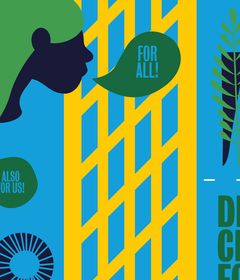In the new Designing Cities For All: RE-generation series ( Re)designing Connection, DCFA partnered up with Shibaura House , a community hub in Tokyo as its next fellow. In this fellowship, we delve into the multifaceted concept of connection on three different scales: humans & non-humans, communities and cities. Our modern urban existence led us to disconnect from ourselves, our communities, and the cities we inhabit. How can we reclaim and (re)design these connections through personal practices and grassroots initiatives? This series aims to explore practical strategies and innovative approaches for reviving the lost essence of connection on both individual and collective levels, fostering a more inclusive city for and with all.
In the 2nd episode of Designing Cities For All: Re-Generation series (Re)designing Connection with DCFA fellow Shibaura House we look into connected communities in over-populated cities. In today’s dynamic urban life, fostering community connection is essential. In this sense, Shibaura House serves as a model for community improvement and brings examples of their in-field practices. During this evening, we aim to understand how we can overcome challenges in densely populated cities and develop connected communities. Speakers explore improving the sense of communities using Tokyo and Taipei as compelling examples of our discussion.
About the DCFA Fellow
SHIBAURA HOUSE is a unique building with a completely glass exterior built in Shibaura, Minato-ku, an area in Tokyo, Japan undergoing redevelopment. It is a community space, but also the headquarters of a 70-year old company. The company’s business has changed enormously to keep in harmony with the changes in the times and in the social environment. Today, it simultaneously operates the original creative business, along with a new cultural creative projects that are rooted in the local community.
About Designing Cities for All: RE generation
Over the first two years of Designing Cities for All (DCFA), we’ve learned about exclusion by design and the (re)design of inclusive cities. Along the journey, a certain question kept popping up: what exactly does ‘for all’ entail? After focusing mostly on the ‘who’ over the past two years, DCFA is rebooting as Designing Cities for All: RE-generation . This way around, the series is also incorporating the ‘what’ by looking through the fresh lens of regenerative design. This emerging field might very well be a promising answer to the challenges of our time, as it focuses on the design of products, services, systems, and processes that lead to both social and ecological recovery and that keep the systems healthy.
About the speakers
Minouche Besters is a partner at STIPO. Her work focuses on creating better places, neighborhoods, and cities, with a lot of attention to human scale, the diverse needs of people, and plenty of room for ownership. Minouche is an experienced process designer and facilitator of transformation processes. She is active in complex inner-city transformations, in which, in addition to creating high-quality urban life with an eye for growth, economic developments, and opportunities for sustainability, urban problems such as crime, nuisance, and social anonymity also play a role. Her toolbox contains numerous working methods around placemaking, participatory research, tactical urbanism, design thinking, and strategic vision formation. Minouche likes to work with the board and senior management to jointly understand with the partners in the city what these changes mean for the street, neighborhood or city, both for the physical layout and for the socio-economic impact.
José Richard Áviles (@soynalgona) is an Urban Planner, Social Worker, and internationally touring Performance Artist native to South Central. Ávile’s work explores the relationship between space, place, and body. In their first piece, Callejera explored the connections between being from the hood and a femme. Ávile’s current research interest lies in the relationship between behavior and the built environment, city consciousness: and community engagement
Justin Yu is the founder and CEO of consultancy firm Plan b in Taiwan. He aims to make design and urban planning sustainable through Plan b. His work provides an integrated set of tools for sustainable development, and he has reactivated existing urban spaces and created new ones such as the Center for Innovation Taipei and ParkUp. Justin has also founded and invested in several startups and is currently a member of the youth advisory group to Taiwan’s Executive Yuan.
Petra Heck is a curator at Stichting NDSM-werf developing site-specific contemporary art projects addressing public notions and social sustainability in response to urban development. At NDSM she works towards the questioning of the public character and values that come with public space with most of the time contemporary artists, but also architects or designers. She has been curating projects with for instance Willem de Haan, Sijben Rosa, Daniele Frazier, Henk Schut, Manaf Halbouni, Guido van der Werve, belit sag, and the recent group exhibition (Un)monumenting with 12 artists among them Selma Selman, Hira Nabi, Selby Gildemacher, Bas Kosters, Clinton Kabena and Krijn de Koning. Currently, she is developing a garden with Studio Ossidiana and a project with John Kormeling for this year, and a ‘library’ with Afaina de Jong for next year. She is also a board member at Public Art Amsterdam, ArtDock, and Kunsthuis SYB.










